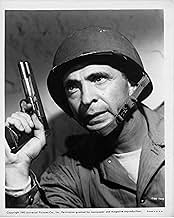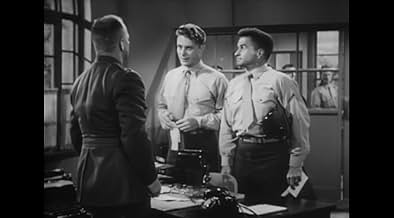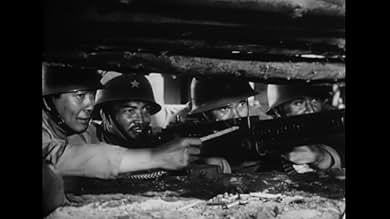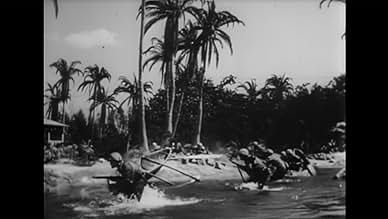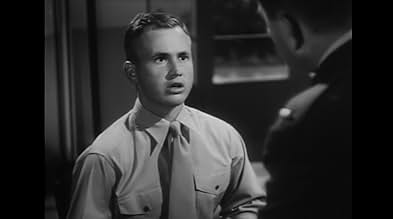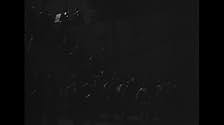The true story of Carlson's Raiders and their World War II attack on Makin Island.The true story of Carlson's Raiders and their World War II attack on Makin Island.The true story of Carlson's Raiders and their World War II attack on Makin Island.
- Director
- Writers
- Stars
- Harry - the Hamburger Man
- (uncredited)
- Chief Clerk
- (uncredited)
- Mess Boy
- (uncredited)
- Director
- Writers
- All cast & crew
- Production, box office & more at IMDbPro
Featured reviews
The second half involves a submarine ride and a raid on an island held by the Japanese. The action is surprisingly intense. Some scenes, like the shooting of Japanese out of trees reach the level of brutal poetic metaphor. These action scenes detail fierce fighting and are surprisingly even handed with both American and Japanese troops biting the dust pretty regularly.
Unlike, "Walk in the Sun" where the audience is given the chance to know and care about each soldier, there is only a pretty stereotyped introduction and then they are molded into one tough killing machine. The title "Gung Ho" we learn means "harmonious work" and that is what we get with precision maneuvers and no hesitation in the face of death on the battlefield.
One could call this communist propaganda, but without films like this, could fascism East and West have been defeated?
As for the film, despite having Randolph Scott and some familiar faces (Noah Beery, Jr., Robert Mitchum and others), it's an amazingly straight-forward and simple film. The usual clichés and side stories, while still present, are much fewer in number and far more emphasis is placed on the training and combat. Additionally, I was amazed at how brutal the film was, as the Raiders were taught to fight very dirty and there was an amazing amount of blood for a 40s era film. It was uncompromising and direct throughout the movie.
The film itself is about a special unit within the Marines that were akin to the Army Rangers or a Special Forces unit. Apparently they were a real group and the film was made about their first mission in 1942--only a few months before this film was produced! Because it was so direct and simple, I really enjoyed the film. However, for lovers of Randolph Scott, while he's in GUNG HO!, his role is rather simple and quite unlike his later persona in Westerns.
By the way, although the film was pretty good, it featured one of the dumber war clichés as one of the soldier pulls a grenade pin with his teeth--a great way to rip out or shatter your teeth.
For more information about this raid (some of which is much more incredible than what is in the film), try http://www.usmarineraiders.org/makin.html.
But Carlson's (here Thorwald's)background, temperament, and training methods were revolutionary, in a literal sense. Between the wars, Carlson had taken a kind of vacation from the Marine Corps and spent it studying the Chinese Communists and learning from them, especially the development of what they called "Gung Ho," which translates as something like "good public spirit" but has been degraded in meaning over the years until, when I was in the military, it had all the pejorative value of "chickenshit." Carlson was a committed leader, openly concerned about his men's welfare, what William James would have called "tender minded." His outfit, men and officers alike, lived together in both training and combat, suffered the same hardship, ate the same food, held bellyaching sessions in which anyone could say anything, good or bad, about anyone else, as close as you get to group therapy. The movie soft pedals much of this, and God forbid the word "communism" should be spoken aloud.
The Raider Battalion's most famous engagement was the raid of Makin Island in the Gilberts (pronounced more like "Moggin" than what it looks like). It wasn't the unqualified success the picture gives us. After the rubber boats reached shore and the attack was initiated, resistance increased and it looked like the raid would fail, so Carlson called for a retreat back to the boats. Unfortunately, as Carlson had foreseen, the heavy surf flooded outboard engines and overturned many of the craft, drowning numbers of men. As it turned out, however, the Japanese had more or less disappeared and the mission was accomplished, except that nine of the men who had not been killed in combat or drowned had gotten lost in the dark or wound up on another atoll. They were later rounded up, taken to Kwajalein and beheaded.
The raid did no long-term damage except to convince the enemy that the Gilberts would soon be invaded (which was true) and that fortifications should be reinforced (which they were). I love this movie. It has every cliché in the book. Brawling rivals, a Jewish sidekick called "Transpawt" by Randolph Scott, treacherous Japs, stupid Japs, Marines throwing knives with deadly accuracy, one of our boys can beat a dozen of theirs, explosions galore filling the air with flying balsa wood, bayonets, judo, interesting rifle-shot sounds, Japanese pilots giggling maniacally while they unknowingly slaughter their own soldiers -- ding hau!
The crowning moment: Colonel Thorwald begins one of those patriotic speeches about how we have to win the war, and the peace that will follow too, and turns mid-way through the speech and looks directly through the camera lens at the wartime audience, and the image on screen becomes a sinking ship flying a Japanese flag. Could there be anything better if you're seeking patriotic laughs from a movie? Shortly after Guadalcanal, the Raider Batallions were both disbanded, the Corps believing that since every Marine was elite anyway the Corps had no need for whole outfits of them.
Randolph Scott plays a character based on Major Evans Carlson of Carlson's Raiders which was an elite unit of Marines trained to take the island. Carlson had seen service in China and was impressed with the Chinese guerrilla campaign against the Japanese there. He studied the tactics of Chu The who was the military commander of Mao Tse-tung's Chinese Communists. I don't know much Marxism, if any, Carlson took to heart, but after World War II it got him in no small amount of trouble. In an organization as conservative and tradition bound as the United States Marines he became a pariah. He died in 1951.
Since the Makin Island campaign was the start of our Pacific Offensive it was natural that Hollywood seized on the opportunity to make a quick B picture as a morale booster. Universal assembled a good cast that included a young Robert Mitchum before stardom. Besides Mitchum, I liked J. Carroll Naish and Sam Levene who gave good support to Scott. Levene played the typical serviceman from Brooklyn which by that time was becoming a cliché in war pictures.
Anyway Carlson's lasting contribution to the Marines was the phrase Gung Ho. So if you want to know how that got into the Marine vocabulary, see this movie.
Did you know
- TriviaHarold Landon, who plays Frankie Montana, relates that the actors who played Japanese soldiers were actually Filipino and Chinese.
- GoofsThe U.S. Marines were not issued Garand semi-automatic rifles in wide numbers until after the Guadalcanal invasion, so it might be thought that the Raiders would have been using M1903 Springfield bolt-action rifles in the Makin raid in August, 1942, which happened as the Guadalcanal campaign began. However, as James Roosevelt, the President's son, was a member of the raiding party, the 2nd Marine Raider Battalion, the unit in the raid, were issued the most up-to-date weaponry, which included Garands; the Makin raid was, in fact, one of the first combat deployments of the M1.
- Quotes
Lt.C.J.Cristoforos: A call has been issued by the commanding general for volunteers for a special battalion to be formed at once. Now this battalion will go into training for a particular combat duty overseas. Those men who can pass the severe requirements of this unit will be assured of immediate acts of service. The work involves close combat with the enemy, and only those men who are prepared to kill or be killed should apply. Those who accept it will be highly trained and will have every chance of survival. But it must be understood, the work is above and beyond the line of duty.
- Crazy creditsPrologue: "This is the factual record of the Second Marine Raider battalion, from its inception seven weeks after Pearl Harbor, through its first brilliant victory."
- ConnectionsFeatured in Hollywood Parade (1944)
- How long is 'Gung Ho!': The Story of Carlson's Makin Island Raiders?Powered by Alexa
Details
Box office
- Budget
- $866,898 (estimated)
- Runtime1 hour 28 minutes
- Color
- Aspect ratio
- 1.37 : 1
Contribute to this page


